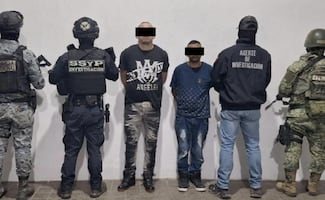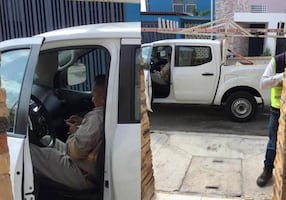Más Información

Senado alista debate sobre "pensiones doradas"; van por acuerdo para toparlas en 70 mil pesos mensuales

Estos son los nuevos lineamientos que deben cumplir Ticketmaster y boleteras en conciertos masivos; DOF publica obligaciones

Secretaría de Marina realiza operativo terrestre y aéreo en la sierra de Badiraguato y Mocorito, Sinaloa; reportan disparos y persecuciones
The Inter-American Commission on Human Rights (IACHR) said that Mexico is experiencing a “crisis of gross violations of human rights”.
In its report “Situation of Human Rights in Mexico 2016” the IACHR said that “despite the change in administration in December 2012, in practice there have been no substantial changes with regard to security policies and the violence levels. In this context, of particular concern are the reports of disappearances, extrajudicial executions and torture, as well as the situation of insecurity for women, children, migrants, human rights defenders, and journalists, who are victims of murder, disappearance, kidnapping, torture, harassment, and threats. Moreover, Mexico is considered one of the most dangerous countries in the world for journalists, excluding countries that are at war.”
It added that “the current crisis of gross violations of human rights in Mexico is in part a consequence of the impunity that has persisted since the Dirty War, and has fostered their repetition heretofore.”
In response to the report, Mexico's federal government said it does not reflect the general situation of Mexico and is based on wrong premises and diagnoses. It added that the report of the Commission focused on "seeking and reflecting specific violations, taking into account the problems in six states."
In its report, the IACHR said that “Mexico has been undergoing a serious situation of violence and security for several years” and added that after the increase in violence result of the war on drugs undertaken during the administration of former President Felipe Calderón that left over 100,000 deaths and thousands of disappearances authorities opted to increase the role of the Armed Forces in law enforcement duties, which include a policy of confronting organized crime and the deployment of joint operations between the armed forces and state and municipal security agencies.
“This situation has sparked yet greater violence, as well as gross violations of human rights in which there has been a notable lack of accountability by international standards,” the IACHR explained.
Even though the IACHR acknowledged the significant constitutional and legislative reforms introduced in Mexico in 2011, the constitutional reform and protocols recently approved to investigate cases of torture and forced disappearance, the Commission said it has confirmed "a deep gulf between the legislative and judicial framework and the daily reality millions of people face in accessing justice, violence prevention, and other public initiatives."
“Time and again the IACHR heard from victims throughout the country that the administration of justice is a simulation,” the IACHR said in its report.
It added that “family members’ discoveries of mass graves with dozens of bodies underscore that they are the ones who have undertaken the search for their loved ones given the State’s ineffectiveness. Meanwhile the authorities do not fulfill their duty to investigate, find, identify, and return the victims with the appropriate due diligence.”
The report highlighted the incidents of violence with involvement of agents of the State, such as the murder of 22 people in Tlatlaya, State of Mexico, some of whom were allegedly victims of extrajudicial executions by army soldiers; the death of civilians presumably at the hands of Federal Police in Apatzingán, Michoacán, in January 2015; the alleged confrontation at the border between Tanhuato and Ecuandureo, Michoacán in June 2015, in which 42 civilians and one Federal Police agent lost their lives, among others.
It also referred to the forced disappearance of 43 young students from the rural teacher’s college “Raúl Isidro Burgos” in the State of Guerrero, on September 26 and 27, 2014 saying that it was a “national and international wakeup call regarding disappearances in Mexico, and in particular in the State of Guerrero. Furthermore, it reflects the serious deficiencies in the investigations into these events and the structural and almost absolute impunity that permeate these serious crimes. This case is also an emblematic example of the apparent collusion between agents of the State and members of organized crime.”
Noticias según tus intereses
[Publicidad]
[Publicidad]











